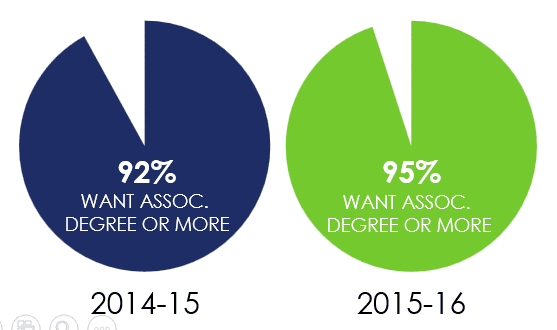A critical precursor to a student being able to graduate high school prepared for college success is to have a well-developed college aspiration. It is not enough, however, for students to simply aspire to go to college. Students must believe that they have the ability to succeed once there and they must understand how their high school preparation will impact their likelihood of success.
College Aspiration Questions
During each survey administration, mentees as asked how much education they:
- Want
- Think they will get
- Need to get to live the live they want
For these three questions, mentees pick one of six answer choices:
Why is College Aspiration Data Important?
Organizationally, this information provides insight into mentees' college aspiration and whether their expectations match their desires when it comes to college. This can help inform design of curricular resources, staff training and preparation of mentors to position them to be successful.
Programmatically, information yielded from college aspiration questions allows staff to provide specific resources to mentees and have nuanced conversations with mentors about their mentees’ goals and expectations. With college success as the ultimate goal of the mentoring relationship, knowledge of mentees’ college aspiration is critical when it comes to providing pairs with the support they need.
What kind of trends have been seen in college aspiration data?
Mentees often want more education than they expect to obtain
Mentees typically report that they want to go to college, but nearly a third have indicated that they want more education than they think they will get. Below, the last two years of post-survey data representing mentee responses to "how much education do you want to get?" versus "how much education do you expect to get.?"

Greater levels of aspiration may lead to a greater change of college enrollment
Students who expressed a higher level of desired education were more likely than students with lower aspirations to enroll in a four-year college. Additionally, students who expressed a desire to earn a graduate/professional degree were most likely to enroll in college within one year. Seventy-four percent of students who wanted to earn a graduate/professional degree enrolled in college within one year. In essence, results indicate that desiring a higher level of education leads to a greater chance of enrollment in college.
What does it all mean?
In order to capitalize on this information, the iMentor curriculum will continue to evolve in a way that ensures students fully understand the benefits of college and provide mentors with explicit opportiunities to talk about all of the ways in which college has provided opportunities in their life trajectories in service of increasing the percent of students who desire a higher education increases. For students that already have a high college aspiration, perhaps the support provided to the pair should revolve around closing the gap between desire and expectation.



